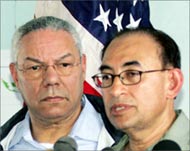WHO seeks quick aid to avoid epidemic
The World Health Organisation has warned that Asia’s tsunami toll could double to about 300,000 unless survivors receive clean water and other basic services.

Coinciding with US Secretary of State Colin Powell’s arrival in Indonesia for an emergency international aid summit on Thursday, the WHO said basic needs must be restored by the weekend to prevent an outbreak of disease.
“If basic needs … are not urgently restored to all populations by the end of the week, WHO fears that outbreaks of infectious disease could result in a similar number of fatalities as occurred due to the direct impact of the tsunami,” the UN agency said in a statement on Wednesday.
The warning came as Powell flew over the worst scenes of devastation and said it was more horrifying than wars he had witnessed during decades as a soldier.
“I have been in war and I have been through a number of hurricanes, tornadoes and other relief operations, but I have never seen anything like this,” he said.
Daunting task
Leaders from 26 nations and humanitarian organisations will attend the day-long international summit on Thursday to look at massive relief and reconstruction needs for rebuilding the shattered lives of millions of people in six Indian Ocean countries.
 |
|
Powell (L) said he was horrified |
Indonesia, the worst-hit nation accounting for two-thirds of the total 150,000 dead, hopes the one-day summit will also agree to set up a regional tsunami warning system, which experts say could have saved many lives.
UN Secretary-General Kofi Annan has meanwhile called on world leaders to honour their pledges of aid, saying it should be “fresh and additional money, not robbing Peter to pay Paul, pulling it from other crises”.
Up to $4 billion has already been promised in relief by different countries.
Australia, Germany and the International Monetary Fund made huge new pledges on the eve of the Jakarta summit and US President George Bush even sent a $10,000 personal contribution.
Australia said it would give $764 million, Germany $668 million and the IMF up to $1 billion.
Global solidarity
|
Some governmental pledges, including loans and grants: AUSTRALIA: $764 million |
In Europe, people from Riga to Rome observed three minutes of silence to remember the dead, who included several thousand tourists, many of them Europeans.
German Chancellor Gerhard Schroeder said he believed the Group of Seven industrialised nations would be able to agree on debt relief for Sri Lanka and Indonesia.
Japan joined other G7 members in supporting a debt payment moratorium, which will be discussed in Jakarta and also at a meeting next Wednesday of the Paris Club of creditor nations.
Japan and the US have confirmed donations of $500 million and $350 million respectively.
Even North Korea, which relies on handouts to feed its own population, has donated $150,000.